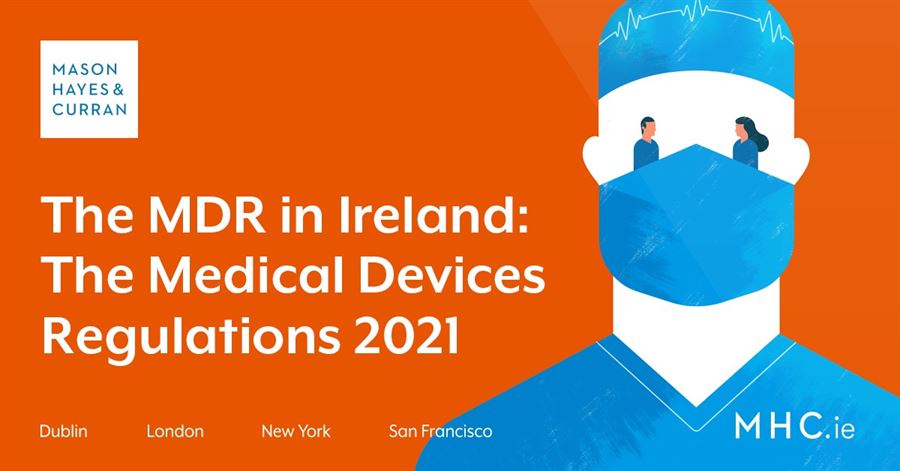
Alongside the EU Medical Devices Regulation 2017/745 (MDR), the Irish Medical Device Regulations 2021 (S.I. No. 261 of 2021) (2021 Regulations) came into operation on 26 May 2021. Following on from the European Union (Medical Devices and In Vitro Diagnostic Medical Devices) Regulations 2017 (S.I. No. 547 of 2017) (2017 Regulations) which designated the Health Products Regulatory Authority (HPRA) as the competent authority with responsibility for ensuring compliance with the requirements of the MDR in Ireland, the 2021 Regulations:
-
Confer various specific functions on HPRA in relation to medical devices under the MDR and designate HPRA as the market surveillance authority for medical devices for the purposes of the Market Surveillance Regulation (EU) 2019/1020 (see our article here) (Regulation 4)
-
Lay down requirements for health institutions to make information available to patients who have been implanted with implantable devices (Regulation 6)
-
Set out the Irish position on processing of single-use devices to make them suitable for further use (Regulation 7)
-
Provide for various matters in relation to clinical investigations of medical devices (Part 2)
-
Make provision for the enforcement powers of HPRA and its authorised officers to ensure compliance with the requirements of the MDR, along with offences for any breaches
Regulation 39 also revokes a pre-existing suite of secondary legislation that had implemented the Directive 93/42/EEC on medical devices and Directive 90/385/EEC on active implantable medical devices. It also makes provision for various transitional arrangements relating to, for example, Article 120 of the MDR (see our article here) and EUDAMED (see our article here) under Regulation 40.
Functions
The 2021 Regulations (which came into operation on 26 May 2021 to coincide with the coming into force of the MDR) confer HPRA with various functions and powers in order to carry out its role as the Irish competent authority for the MDR. Regulation 4 gives functions to HPRA in areas such as:
-
Classification of devices
-
Authorisation and monitoring of clinical investigations
-
Derogation from conformity assessment procedures
-
Analysis of vigilance data
-
Provision of scientific technical and clinical opinions and advice
-
Preventive health protection measures
-
Confidentiality and data protection
As can be seen, the 2021 Regulations make clear that the HPRA is the primary contact point for economic operators, notified bodies, sponsors, and other official agencies in relation to the MDR at national level.
Implantable and Single-Use Devices
The 2021 Regulations address implantable and single-use devices specifically. They require health institutions to supply implant cards to patients no later than 30 days following implantation and create an offence where this requirement is not complied with.
The 2021 Regulations also stipulate that a single-use device should not be reprocessed unless requirements on compliance, reprocessing and labelling under the MDR (Article 17(6), (7) and (8)) are met. Failure to comply with these requirements is also an offence under the 2021 Regulations.
Clinical Investigations
Part 3 of the 2021 Regulations set out some national requirements and procedures for clinical investigations such as:
-
Qualifications of individuals involved in clinical investigations
-
Submission of opinions prepared by national research ethics committees
-
Co-ordination between national research ethics committees and HPRA
-
Appeals of decisions in relation to clinical investigations
Further implementing provisions regarding the role of national research ethics committees in the context of clinical investigations for medical devices are also set out in a separate statutory instrument, the European Union (National Research Ethics Committee for Clinical Investigations of Medical Devices) Regulations 2021 (S.I. No. 260 of 2021) (see our article here).
Enforcement
The 2021 Regulations also make provision for HPRA to effectively ensure compliance with the MDR in a number of ways:
-
Investigation: Authorised officers have powers to enter and inspect premises, search vehicles, inspect or take records or other documentation, take samples and carry out necessary tests, analyses or checks, secure telecommunications and remove products from an online interface where necessary. An authorised officer may also apply to the District Court for a warrant to enter a dwelling to perform various functions, and it is an offence to obstruct or interfere with an authorised officer or any other person performing his or her functions under the 2021 Regulations.
-
Orders: As well as warrants to enter dwellings, authorised officers can apply to the District Court for a production order to make available any particular material for the purposes of investigating compliance with the MDR and the 2021 Regulations. Authorised officers may also serve a compliance notice on persons concerned, identifying instances of non-compliance with the requirements of the MDR and corrective actions to be taken within a specified timeframe, or a quarantine notice in respect of devices deemed to pose a serious risk to human health. Prohibition orders can also be served in cases of non-compliance with the requirements of the MDR, non-compliance with a compliance notice, or where a device presents an unacceptable risk to the health or safety of patients, users or other persons, or to other aspects of the protection of public health. In cases of contravention of a prohibition order, HPRA can seek an order of the High Court prohibiting the continuance of the relevant activities.
-
Offences: Along with a detailed category of general offences under Regulation 24, the 2021 Regulations also provide for comprehensive lists of specific offences by manufacturers, authorised representatives, distributors, importers, economic operators, notified bodies, health institutions and sponsors.
Conclusion
The 2021 Regulations draw into focus how the MDR is implemented in Ireland. Stakeholders with operations or partners in Ireland should therefore familiarise themselves with their contents in order to ensure that they fully understand how compliance with the requirements of the MDR are monitored and enforced in this jurisdiction.
For more information and expert advice on how medical devices are regulated in Ireland and the EU, contact a member of our Life Sciences Regulatory team.
The content of this article is provided for information purposes only and does not constitute legal or other advice.





